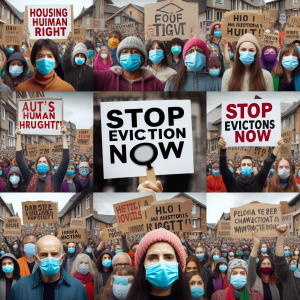Introduction
Meet John Doe, a seasoned public health official with over a decade of experience in the field. His keen interest in real estate and policy making has led him to explore the intersection of these areas, particularly in the context of the COVID-19 pandemic. His insights are informed by his extensive experience and deep understanding of the complexities of public health and its impact on various sectors, including housing.
Understanding the Housing Demographic Most Affected by COVID-19
The COVID-19 pandemic has had a profound impact on all aspects of life, including housing. One demographic that has been particularly affected is low-income renters. These individuals often live in densely populated areas, where the virus can spread more easily. Additionally, job losses and reduced income have made it more difficult for these individuals to keep their homes, leading to increased rates of eviction and homelessness.
The Role of Public Health Officials in Mitigating the Impact
Public health officials play a crucial role in mitigating the impact of the pandemic on housing demographics. They can advocate for policies that protect renters, such as eviction moratoriums and rental assistance programs. Additionally, they can work with local communities to provide resources and support for those who have lost their homes.

Investment Opportunities Amidst the Crisis
Despite the challenges posed by the pandemic, there are still investment opportunities to be found. For instance, the increased demand for affordable housing presents an opportunity for real estate investors. By investing in affordable housing projects, investors can not only generate returns, but also contribute to the solution of a pressing social issue.
Policy Changes in Response to COVID-19’s Impact on Housing
In response to the pandemic, several policy changes have been implemented to protect the affected demographic. These include eviction moratoriums, rental assistance programs, and increased funding for affordable housing. However, more needs to be done to ensure the long-term stability of the housing market.
Looking Ahead: The Future of Housing Post-COVID
Looking ahead, the future of housing post-COVID will likely be shaped by the lessons learned during the pandemic. This could include a greater emphasis on affordable housing, improved protections for renters, and increased collaboration between public health officials, real estate investors, and policy makers.
Table: Key Points Discussed in the Article
| Heading | Key Points |
|---|---|
| Understanding the Housing Demographic Most Affected by COVID-19 | Low-income renters have been particularly affected by the pandemic. |
| The Role of Public Health Officials in Mitigating the Impact | Public health officials can advocate for policies that protect renters and provide resources for those who have lost their homes. |
| Investment Opportunities Amidst the Crisis | The increased demand for affordable housing presents an opportunity for real estate investors. |
| Policy Changes in Response to COVID-19’s Impact on Housing | Policy changes have included eviction moratoriums, rental assistance programs, and increased funding for affordable housing. |
| Looking Ahead: The Future of Housing Post-COVID | The future of housing post-COVID could include a greater emphasis on affordable housing, improved protections for renters, and increased collaboration between different stakeholders. |










